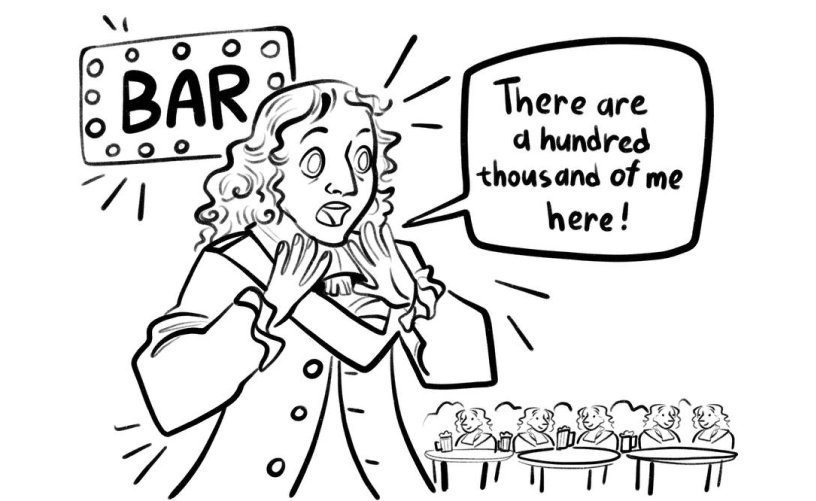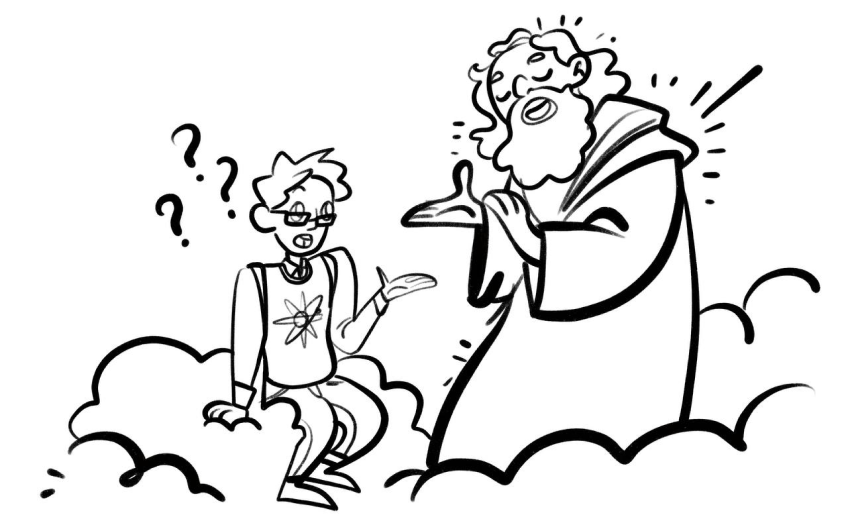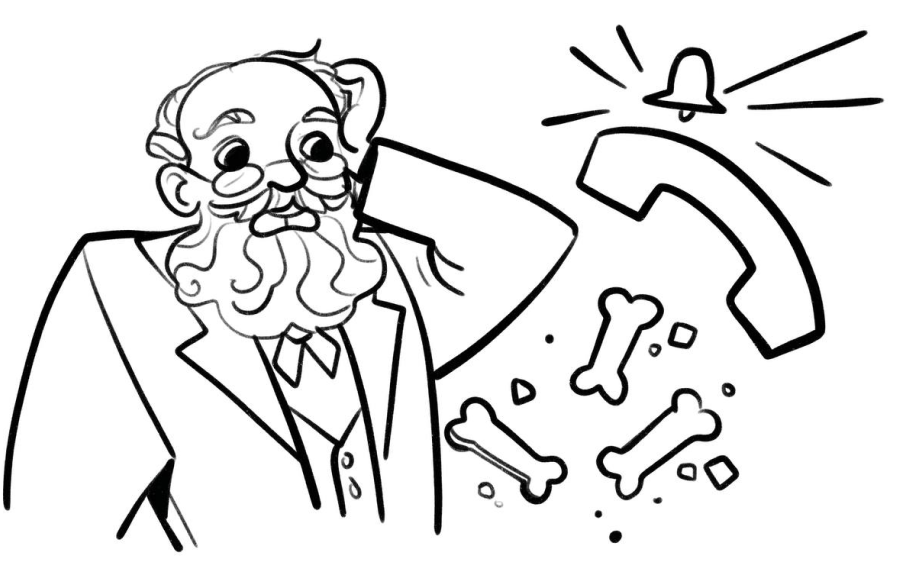How to understand the humor of scientists so as not to screw it up. Weird science jokes with explanations
Many people are indifferent or disdainful of scientific humor. Science jokes seem incomprehensible because they often require special knowledge to understand and lack a clear moral. It’s not fair. Since The Global Technology magazine is not only a scientific resource, but also an entertaining one, we couldn’t come up with anything better and more absurd than to explain popular scientific jokes.
Pascal walks into a bar, and there are a hundred thousand pascals in the bar.
Don’t you think it’s funny? Very strange! Now let us try to explain it.
The premise ‘… walks into a bar’ is often used in scientific jokes. Who didn’t visit the drinking establishment! Electron, neutron, boson, noble gas atoms and even an infinite number of mathematicians.
In our joke, it is Blaise Pascal, the great French intellectual who wrote philosophical treatises, invented an adding machine, and did a lot more in mathematics, physics and other sciences.
Then the play on words begins. The ordinary meaning of the word “bar” is a place where you can drink something. But the same name is given to the unit of measurement of pressure, which comes from the Greek – gravity (hence the hyperbaric chamber, the mineral barite, the particle baryon). One bar is approximately equal to the pressure of the earth’s atmosphere, which is convenient.
But there is another unit for measuring pressure – the pascal, which corresponds to the effect of a force of one newton on an area of one square meter. A bar is equal to ten to the fifth power of pascals, that is, the French thinker saw one hundred thousand of himself not because he was drunk, but quite objectively.
Scientists are conducting a survival experiment. A physicist and mathematician are locked in separate rooms. In each room there is a locked chest with food, there are no keys. A week later they come with a check.
They go to the physicist. The chest is carefully opened, the physicist is full and satisfied, and shows a sheet of paper with calculations, ‘I simply applied a load to the stress points of the chest and it opened.’
They go to the mathematician. The chest is closed, the floor and walls are covered with formulas. An angry, skinny mathematician walks back and forth and mutters, ‘Assume the chest is open… Assume the chest is open…’
This anecdote is a comprehensive illustration of the fact that in mathematics there is no experimental verification, and only proof is a “certificate” of the correctness of a particular statement. You can say it differently: what many mathematicians believe, physicists already know.
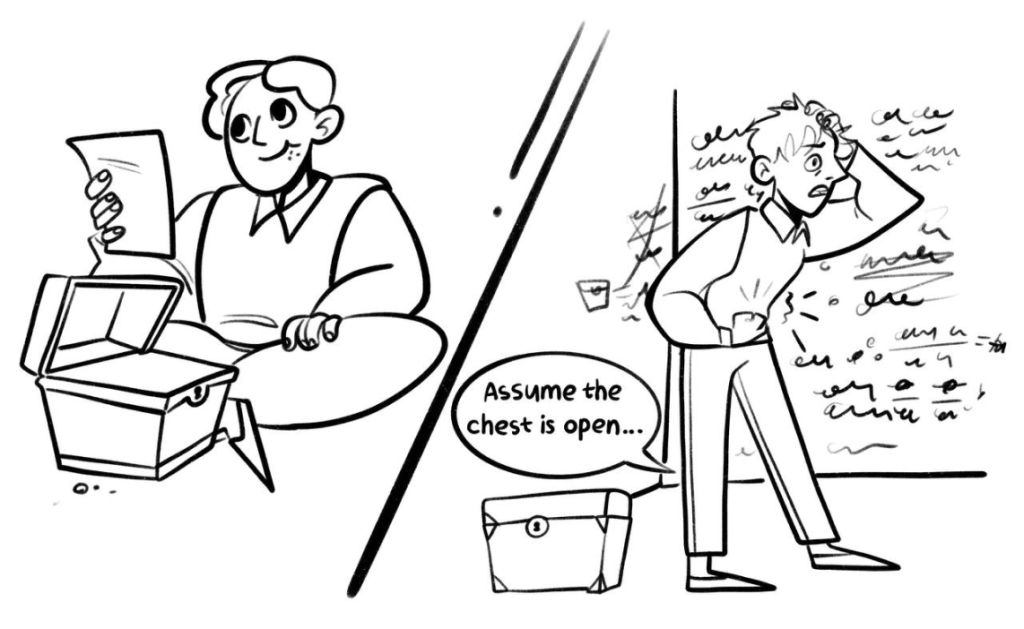
A quantum physicist goes to heaven and asks God:
– Lord, tell me how you created the Universe?
– In short… Dark energy inflation ended with the formation of particles and antiparticles, quark-gluon matter continued to expand and cool… About the same way you, physicists, describe the Big Bang.
– How did you create all living things?
– Well… Abiogenesis, then the RNA world, then billions of years of prokaryotic evolution…
– And man, how did you create man?
– Darwin described this in the evolution of primates.
– But the Bible says about seven days!
– And if you were me, would you tell the shepherds about antiparticles, abiogenesis and evolution?!
When Newton and Leibniz turned the idea of the universe upside down, the church’s right to the only correct interpretation of the truth collapsed, and physicists in the public’s mind became persons especially close to the Creator. Even modern popular beliefs say that physicists can accidentally destroy the world by creating a black hole or something else in a collider.
Now it is physicists who are engaged in the first days and first seconds of creation. It is physicists who are now finding out whether the world is illusory. It is physicists who now prove or disprove theological postulates, such as the anthropic principle.
In a word, physicists are on friendly terms with God and know much more about his intentions and tastes than ordinary mortals.
Not surprisingly, there are many anecdotes about physicists and God, and perhaps they are worth listening to, because they are told by physicists themselves, and they know what they are talking about.
Albert Einstein, like all physicists, goes to heaven, where God greets him with special honors:
– It’s nice to see a truly smart person! Tell me what can I do for you?
– I want to see the equation of the Universe.
The Lord shows the equation.
– But there’s an error here!
– Yeah, I know, – answers God.
All physicists love this joke. You bet! Einstein puts himself on the same level as God, pointing out the mistake to the Creator. But the point of this joke is that God knows about the mistake and deliberately does not correct it, believing that the world must be imperfect. Otherwise how will he surprise us?
Three logicians shoot from a bow. The first logician misses the mark.
The second logician takes the arrow and also misses. The third one starts jumping on the spot and shouting, ‘Hurray, I did it! I did it!’
The main charm of jokes about logicians is that they are more logical than funny. While we are puzzling over the meaning of a joke, trying to understand the logical chain, logicians are puzzling over how we can laugh at jokes that have no logic. This is not logical!
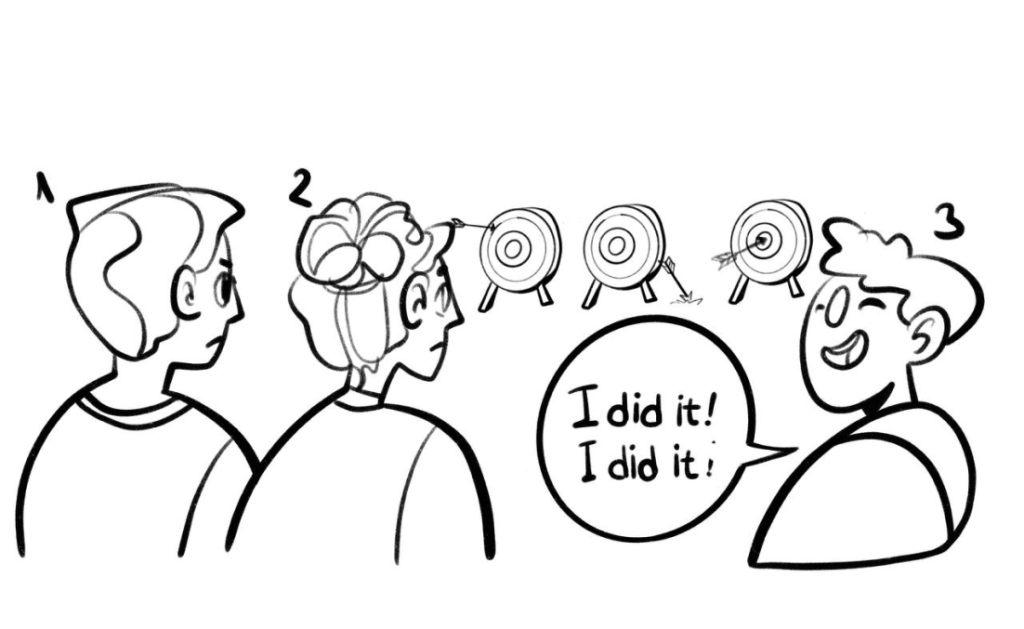
Three logicians came to a cafe and the waiter asked them, ‘Would all of you like tea?’
The first logician says, ‘I don’t know.’ The second logician says, ‘I don’t know.’ The third logician says, ‘Yes!’
In fact, how can you, without knowing the desires of the people in the cafe, answer the question about tea in the affirmative? Or how, without knowing the desires of the people in the café, answer the question about tea in the negative? Still logical!

A programmer gets sent to the store, ‘Get a gallon of milk, and if they have eggs, get a dozen.’
The programmer returns home with 7 gallons of milk. They ask, ‘Why have you bought 7 gallons of milk?’ – ‘They had eggs.’
Another example of original logic. When an ordinary person is given the task: ‘Buy milk. If the store has eggs, take a dozen of them,’ he will most likely figure out that they need to buy one gallon of milk and, if the store has eggs, they need to add twelve eggs to the purchase. However, in the anecdote, the programmer interprets the instruction literally, as a condition in programming: ‘Buy milk’ is a basic action, and ‘If there are eggs in the store’ is a condition that changes the amount of milk and does not refer to the number of eggs. Since there were eggs in the store, the programmer picked up twelve gallons of milk, interpreting the instructions as a program would,
following the exact condition without understanding the context or the implicit assumptions inherent in human communication.


Q: How many programmers does it take to screw in a lightbulb?
A: None. We don’t address hardware issues.
The editors of the magazine believe that this situation is too real and does not need explanation.
A girl gets into an unmanned taxi and looks around, ‘Well, it’s a car without a driver!’
And the machine answers her, ‘Actually, I’m an artificial intelligence for business, and taxi is just a side job.’
Is there a need to talk about how often you can meet taxi drivers who are brilliantly versed in politics, have a profitable business, write philosophical treatises, successfully play on the stock exchange and accurately predict the future. They know exactly how to reduce taxes and improve migration policy! They just don’t get around to it, because they have to drive a taxi.
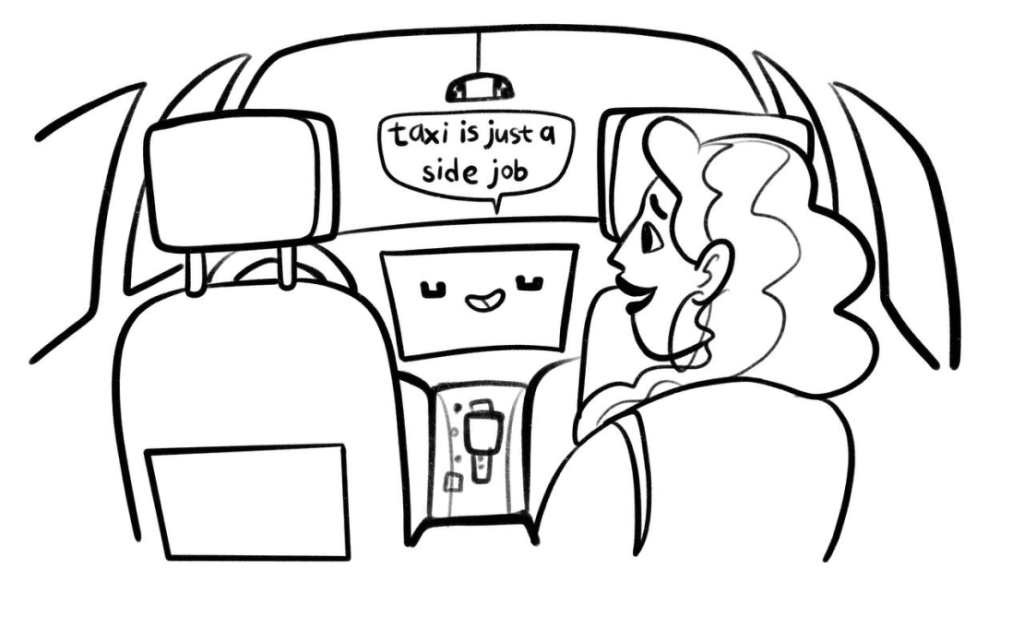
Scientists have created the most powerful supercomputer and ask a question:
– Does any God exist?
The computer thought for a while, buzzed and replied:
– The question is incorrect. There is not enough information to answer. Connect me to all the most powerful supercomputers on the planet.
The scientists complied with the computer’s request and asked again:
– Does any God exist?
The computer thought for a while, buzzed and replied:
– The question is incorrect. There is not enough information to answer. Connect me to all the PCs, nets, servers, connect me to everything!
The scientists did that too, after which they asked again:
– Does any God exist?
The computer thought for a while, buzzed and replied:
– Now God really exists!
An anecdote, invented a quarter of a century ago, has not lost its relevance at all: in the early 1990s, people laughed at the forecasts associated with the uprising of machines, which were used to scare people in the 1960s. Now you can smile, remembering the forecasts of the nineties, and be frightened by how rapidly artificial intelligence is developing.
Q: What does the B stand for in Benoit B. Mandelbrot?
A: Benoit B. Mandelbrot
At first glance, it seems that there is no meaning in this anecdote and the anecdote itself is not very similar to an anecdote. However, there is a meaning in the joke and it is in recursion. The situation when an object suddenly turns out to be part of itself is called recursion. Remember the intro to The Simpsons when the family runs together to watch the intro of themselves on TV?
Movies generally love recursion – for example, in the film Adaptation, based on a script by Charlie Kaufman, Charlie Kaufman writes a script about how Charlie Kaufman writes the script for the film Adaptation. There is even a whole direction in cognitive science in which the ability to recurse is considered the main human talent. And with the help of recursion, some especially enterprising marketers confuse unlucky buyers.
Ivan Pavlov, a famous physiologist and Nobel Prize winner, is sitting in a restaurant. The phone rings.
‘Damn it! I forgot to feed the dogs!’ the academician jumps up.
Only those who are not familiar with the theory of the conditioned reflex will not laugh at this short joke. Over time, Pavlov himself developed a conditioned reflex and absolutely any ringing sound gradually began to remind the academician of the need to feed the dogs.
Scientists are writing a report on a laboratory study of the effectiveness of a new drug:
– 33% of experimental animals responded to the drug with positive dynamics.
– 33% showed indifference to therapy.
– Unfortunately, the third mouse ran away.
This anecdote is about the experimental technique, sample size, and missing measurements. Naive logic tells us that if one object has some property, then another similar object will have it as well. If one glass breaks when falling from two meters height onto the stairs, then the other glass will also break.
But the real world is much more complicated, even in the case of a glass. The broken glass could have a hidden defect, or it could be affected by the speed at which the glass fell, or the hardness of the ladder itself, or something else. To be sure, you need to drop at least a dozen, preferably several hundred, glasses. It is advisable that different people throw them in order to exclude the influence of the experimenter on the result.
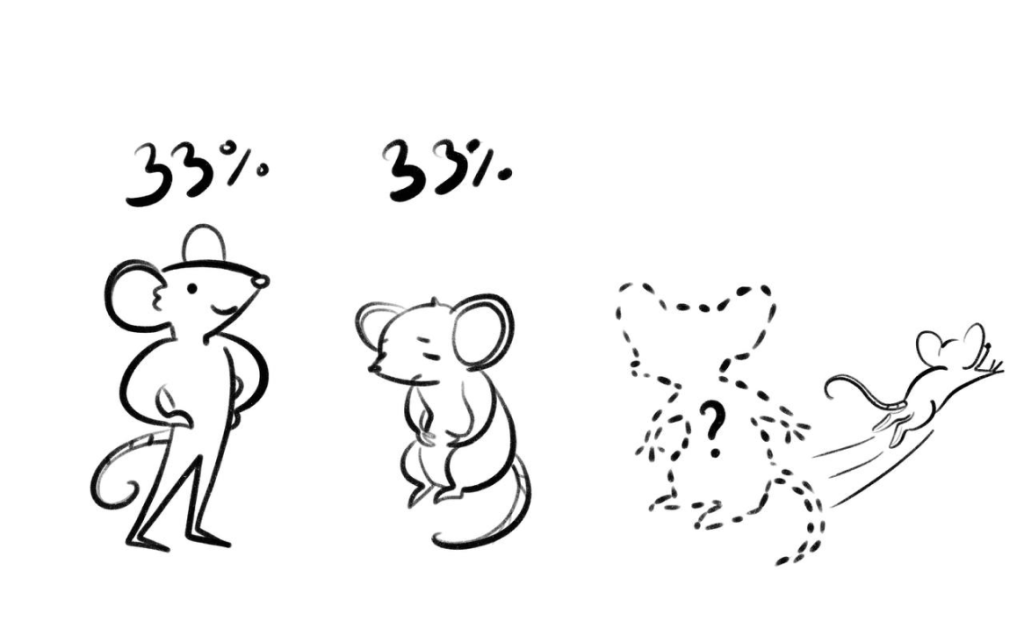
Therefore, do not rush to say: ‘Scientists have messed something up again!’ Science can obtain relatively objective results. You just have to work very seriously with the methods, tell jokes and make sure that no mice run away.
Linear-arithmetic synthesis is based on sound formation. We’ve synthesized the perfect formula of facts and interest.
Thank you!


